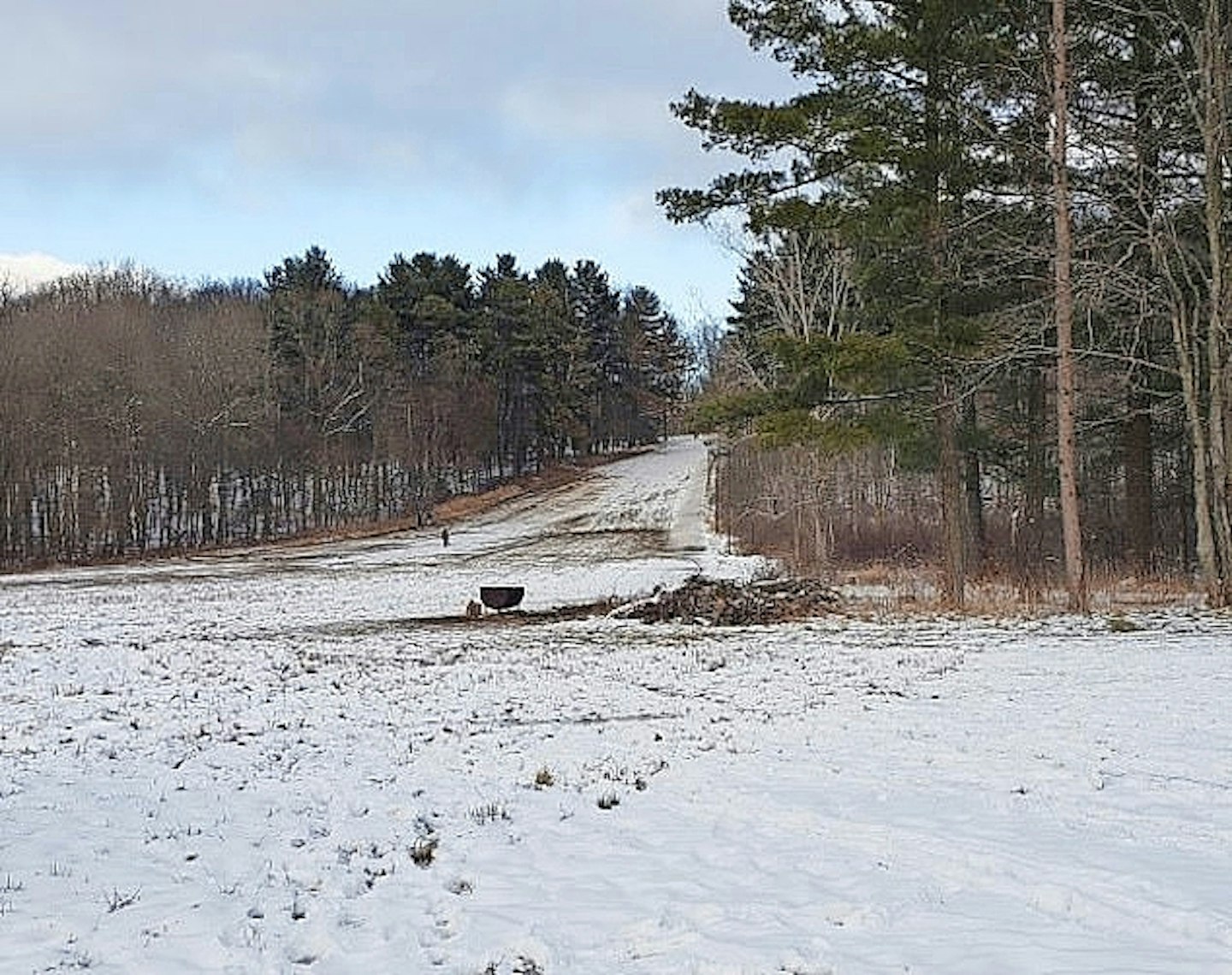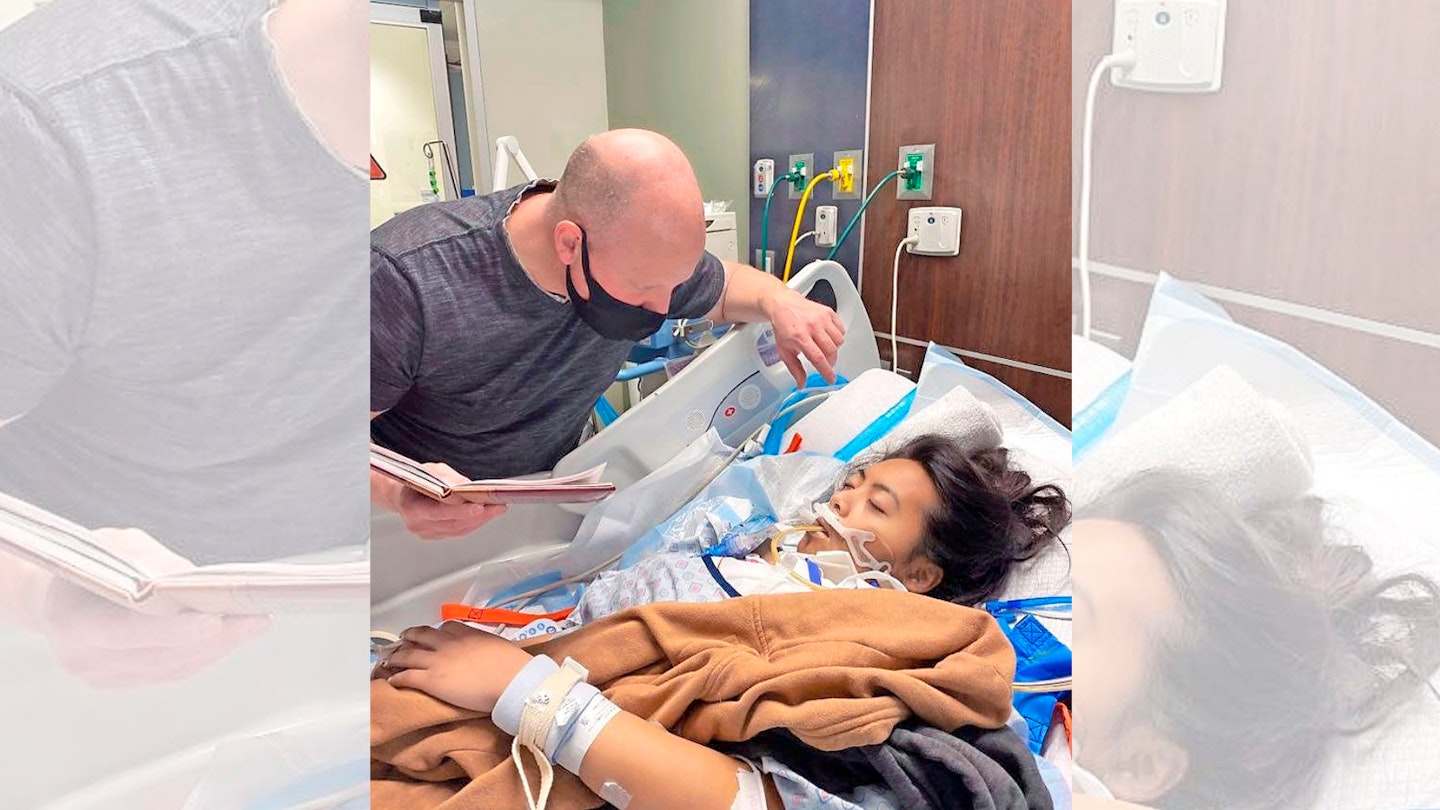Gina’s girl Natalie had gone out on a wintery adventure, when disaster struck…

It was a freezing cold day, but while my husband Jim and I were planning on staying close to the nearest radiator, our 17-year-old daughter came bouncing down the stairs.
She was wrapped up warm, in a coat, hat and scarf.
‘Guess what, Mum…’ she announced excitedly. ‘I’m going sledging!’
‘Oh gosh, be careful, Natalie,’ I told her. ‘There might be snow, but it’s also quite icy out there.’
‘Don’t worry, Mum,’ she replied. ‘It’s only sledging.’
Natalie and her pal were going to the local park, where there was a huge hill for sledging.
They’d been the year before when it snowed, and had an amazing time whizzing down the white hill.
Even when there wasn’t snow, we’d visited the park many times.
‘All right, but don’t be out too late,’ I fretted. ‘It gets dark so early these days.’
‘I won’t, Mum,’ she said. ‘See you later.’
A couple of hours passed and I was expecting Natalie home, when the phone rang.
I heard the words no parents should ever have to hear.
‘Mum, I’ve hit a tree and can’t move my legs,’ Natalie said. ‘I’m so scared. It hurts to breathe. Mum, am I going to be paralysed?’
She sounded frantic.
I put her on speakerphone so my husband Jim could hear her
too, and she repeated what she’d told me.
‘Don’t worry, you’ll be OK,’ I tried to reassure her. ‘Dad is coming to get you.’

Jim grabbed his car keys and ran out the front door. But I felt useless at home.
All I could do was pace the floor.
My other children tried to calm me down.
Before long, Jim called and told me what had happened.
Natalie and her friend had decided to take one last trip down the hill before going home.
But their sledge had veered off course and crashed into a tree.
‘We’re on our way to hospital,’ Jim said. ‘Natalie’s in a bad way. She’s in the ambulance. I’m following behind.’
Please pray for Natalie, I urgently texted our family and church friends.
It wasn’t long before Jim rang me from hospital. Natalie had already been given a CAT scan.
‘Natalie has sustained catastrophic damage to her spinal cord and broken her back,’ he explained. ‘The doctor said she’ll likely never walk again.’
‘No!’ I gasped.
Natalie never exaggerated, but I’d really been hoping she had been overplaying things when she’d told us she couldn’t feel anything, and was just a bit stunned.
But now I knew she really was in dire straits.
'I'm so sorry this has happened'
She’d been scheduled for emergency surgery.
‘I’m coming to hospital,’ I said.
I rushed there, and made it in time to see Natalie before she went into theatre.
‘I’m so sorry this has happened,’ I sobbed, kissing her forehead.
All night I paced in the waiting room, until we received news on how the surgery had gone.
‘It went as planned, but we discovered additional serious injuries,’ Natalie’s surgeon said.
She’d suffered six broken ribs and a partially collapsed right lung.
The day after Natalie’s accident, I found out in the local news about a 14-year-old girl who’d died after a sledging experience.
A branch had gone through her eye, which she eventually died from.
‘She was sledging down the same hill,’ I gasped to Jim.
My blood ran cold.

Over the next few days, Natalie gradually improved.
Despite being paralysed from the chest down, we hoped for some feeling to return in her lower extremities.
‘Can you feel this?’ I asked, touching her feet and legs.
‘No,’ she said.
‘What about this?’ I asked, trying another area.
‘I can’t feel anything, Mum,’ Natalie exclaimed.
She was getting very panicked.
Then, days later, she suddenly started gasping for breath.
‘What’s happening?’ I cried.
‘She can’t breathe,’ said the nurse.
Doctors and nurses manually pumped air into her lungs for four hours to stabilise her breathing.

However, this life-saving act caused her left lung to partially collapse.
‘Natalie may not make it,’ a doctor told us. ‘You should prepare yourselves.’
I couldn’t believe this was happening.
We went to Natalie’s bedside to say our goodbyes.
With tubes coming out of her mouth and nose, and wires covering her chest and arms, it felt like we were in a nightmare.
‘Love you, Natalie,’ we whispered into her ear. ‘Fight for your life.’
A few of our friends waited with us.
Later that day, the doctors approached us again.
‘Natalie’s condition is becoming more stable, but she’s not out of the woods yet,’ they said.
She began to regain consciousness, but she needed more surgery — this time on her right lung.
She had tears in her eyes as she spoke to me before the operation.
'I hope I don't wake up from surgery'
‘Mum, I hope I don’t wake up from surgery,’ she cried.
‘You’ve got to stay positive,’ I said.
‘I was, but I keep getting let down,’ she whispered.
My heart broke for her.
Her entire future was one big unknown — Natalie would likely never walk again, or have control of her bowels and bladder.
She was a teenager. Just weeks before, she could drive. She had a part-time job.
How could she get her head around being paralysed?
We were grateful Natalie could use her hands and arms and her brain function was completely normal, but it wasn’t enough.
Luckily the surgery was again a success.
Jim and I spent all of the next day at Natalie’s bedside, then her grandma showed up, so we could return home and be with our other kids and sleep.
Weeks went by and Natalie kept going. In time, she was well enough to be moved to a rehabilitation centre.

She pushed through three hours of gruelling therapy every day to regain her freedom.
She learnt to lift and move her legs, and to sit up, all without her core muscles.
Finally, doctors told us she could come home. But the house had to be converted.
A ramp was built for Natalie to help her get into our home, and an adjustable bed was installed, along with other equipment.
The first two months at home were hard on Natalie.
She no longer had privacy to go to the bathroom, shower or change her clothes, as I had to assist her.
Most nights I fell asleep crying, and woke up worrying about her future.
I grieved for her not being able to walk down the aisle on her wedding day, the ability to care for her children without assistance and what the injury would do to her body years from now.
I tried my best to be strong for her.
One night, I left her room to cry in mine, because it was just too much to handle.
I became Natalie’s full-time carer while Jim went back to work.
She became more confident, and life began to get easier for all of us.
We soon found a new rhythm to life.

However, some days were more challenging than others.
One day I pushed Natalie in a wheelchair around a local amusement park.
Only a year before, she had run from rollercoaster to rollercoaster.
‘Sorry, you can’t go on this ride,’ the park employee said.
The majority of rides wouldn’t allow a paralysed person to have a turn.
‘It’s so unfair,’ Natalie sobbed, realising she would never go on a ride again.
In hindsight, the hill should have been closed off as soon as that poor girl was injured.
In the future, I believe barriers should be erected to help prevent any further incidents.
Sledging is great fun, but it’s also very high-risk.
I couldn’t be more proud of Natalie, for the way she’s handled the painful journey she’s been on.
I continue to pray that she may one day walk again, but I’m also prepared that this may be life as we know it permanently.
Our family’s lives changed forever — all because of one day on that snowy hill.
Gina Wilson, 47
